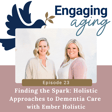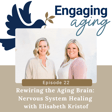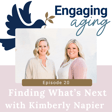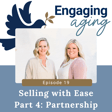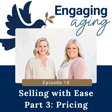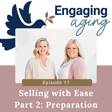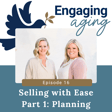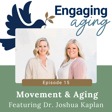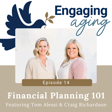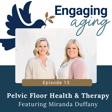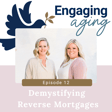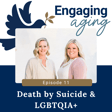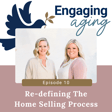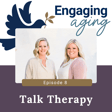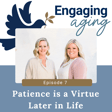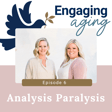Become a Creator today!Start creating today - Share your story with the world!
Start for free
00:00:00
00:00:01

Raising the Bar: Why Becoming a Certified Senior Advisor (CSA)® Is the Gold Standard in Aging Services
In this powerful episode of Engaging Aging, Lauren Watts sits down with Curtis Peterson, National Director of Sales at the Society of Certified Senior Advisors (CSA)®, for an honest and insightful look at what it really means to serve older adults with integrity.
Together, they explore:
- Why the (CSA)® designation is more than just a credential—and why it should be the baseline for professionals in the aging space
- The ethical risks of stepping outside your scope (especially in real estate and senior living referrals)
- How to build a trusted, multidisciplinary network to better support older adults
- The growing wave of real estate agents becoming (CSA)® designees—and how it’s transforming the industry
- What older adults and their families should look for when vetting professionals
Whether you're a real estate agent, care manager, financial advisor—or simply passionate about aging well—this episode will challenge you to elevate your standards, deepen your knowledge, and recommit to putting the older adult first.
🔗 Learn more at www.csa.us
Transcript
Podcast Introduction
00:00:00
Speaker
Welcome to Engaging Aging. I'm Erin DiCarlo. And I'm Lauren Watts. We believe life gets richer with age, and we're here to prove it. We bring you real conversations about aging well, living fully, and navigating this journey with confidence.
00:00:15
Speaker
So let's dive in, because aging isn't something to endure, it's something to embrace.
00:00:22
Speaker
Welcome
Introduction to Curtis Peterson and CSA
00:00:23
Speaker
back to Engaging Aging. It's Lauren Watts. And today i am so excited to welcome Curtis Peterson, the National Director of Sales for Certified Senior Advisors, which is the leading certification for professionals serving older adults. Curtis, it is a pleasure to finally have you on our podcast. Thank you for making the time.
00:00:46
Speaker
And I don't know about you, but I'm really looking forward to a very engaging conversation ah for us to have today. So welcome. um as you and know, Erin and I are both advocates for the older adults.
00:01:02
Speaker
um Simultaneously, we also provide education for professionals inside our industry and outside our industry. And so our listeners today are usually made up of the older adult themselves.
00:01:17
Speaker
those that are supporting them in their aging journey, as well as professionals. So I'd love
Founding and Purpose of CSA
00:01:24
Speaker
to start by having you introduce yourself and sort of just the overall organization of certified senior advisors, where it came from, um how it started, and why it's so important for professionals and older adults to know about.
00:01:41
Speaker
Yeah, absolutely. And thank you very much for having me. It's a real pleasure. Absolutely. So i you know, i've been with the society for almost 19 years now. So obviously, you know, when I when i first encountered the the program, it really resonated with me. And I was, you know, I founded by a gentleman named Ed Piddock in 1997.
00:02:06
Speaker
And after speaking with Ed, i you know, it really comes down to one thing. This is really about helping older adults age successfully. And it it's for the benefit of older adults.
00:02:18
Speaker
So,
CSA Program and Accreditation
00:02:19
Speaker
you know, I think what Ed realized back then is that there really was no good wide, you know, spread information about aging that professionals could oh take advantage of in their approach to helping older adults.
00:02:38
Speaker
So what he did is he brought together subject matter experts in finance, health, social, all these different areas of aging to provide a good groundwork to help people in different professions really be able to ah have a better view and understanding overall of all the complexities people face.
00:03:00
Speaker
So the program has not changed since 1997. I know we're very much multidisciplinary and have been um really since the beginning. so it was intended to just really provide professionals with a much better understanding of folks that they're actually helping.
00:03:17
Speaker
I'm curious because we've been in the aging space for a really long time as well, and there are so many different designations, certifications that are out there ah really focused on supporting the older adult. We are also in the real estate space, as you know, so we have seniors real estate specialists.
00:03:36
Speaker
There are other programs that are out there. From your perspective, what makes CSA different than the other programs that are out there? And they're you know they're not all created equal, right? They all have their purpose and their space in this landscape, but what are your thoughts in terms of what CSA really brings to a professional and to the older adult that they're supporting?
00:04:01
Speaker
Yeah, and
Ethical Standards and Maintenance
00:04:02
Speaker
I think that's the key there. They all have their place in in providing you know good information to industry. So mean obviously, one of the big differences in CSA is that we are a multidisciplinary credential.
00:04:15
Speaker
um ah SRES provides good information specific to real estate. Other professions have credentials and licensing requirements. um You know, so I think in in the big scope of things, what what makes CSA so important is really supplementing that specific industry knowledge, really with all of the other complexities that people really are going to face as they age.
00:04:42
Speaker
um So that's certainly one big way, you know, that we're a lot different. And and we ah we pride ourselves in, you know, having members in all different disciplines and a vetted network.
00:04:53
Speaker
um Frankly, that's a big part of the program. In another way that we're quite different, and there's a lot of programs out there calling themselves certifications, um and there there's a lot of great programs out there. But one reason we're different is we're actually an accredited certification, which is surprisingly not as common as you think.
00:05:15
Speaker
um I think somewhere around less than 11% of credentials um are actually accredited. And so why is that important? Well, it's important because as a third party validation, it's really a guarantee that you have high standards, the programs developed with rigor, has ongoing requirements, you know disciplinary guidelines, all these important aspects.
00:05:39
Speaker
So it's a big deal and we actually have the distinction of having accreditation by two national accrediting bodies, both ANAB, NC National Accreditation Board and NCCA, which is the National Commission for Certifying Agencies.
00:05:54
Speaker
So those are just, you know, a couple ways that really I think CSA is quite different and you unique um and yet supports other credentials that that are industry specific.
00:06:05
Speaker
I have to say from the professional standpoint of being a CSA myself, and Erin and I talk about this a lot, and we've shared it with you and your team as well. There's a difference when you have to go through a process of keeping up your continuing education for CSA and what that means, but also um the quality assurance component that comes with CSA as well and really making sure that the professionals that are under and certified by CSA are of the utmost ethical standards as well.
00:06:43
Speaker
And we've had a situation here where you know, someone didn't um trust in what we had done and they had gone to the board and the board really investigated it. And we give um a lot of credit to what was done. it was not just a small investigation. It was pretty lengthy. And I think that that speaks volumes to the older adults that we serve, but also to the organization that this is not just something that you know, anyone and everyone can get and stands behind. it's It's quite elaborate in terms of the process in which CSA goes through and make sure that the professionals that are CSAs are held to ethically, which I think is fantastic.
00:07:28
Speaker
I'm sure that you've seen many instances over the years in what that means. And can you speak a little bit to that in terms of what is required of the board?
00:07:39
Speaker
Yeah, I mean, I think that's, you know, it's a really good point. You know, as a CSA, you're really required to agree and abide by a code of standards. um It's the CSA code of professional responsibility.
00:07:51
Speaker
And that really outlines guidelines and trustworthiness, competency, and all the different areas that are really going to be important. um And built into our program, of course, is a disciplinary council, a complaint process, um all those important aspects of, you know, making sure that, you know, we have people that are in the in the right space in their mind and so forth who are operating out there as CSAs and whatever profession they're in and abiding by by those codes and then those ethical processes.
00:08:27
Speaker
um So, yeah, I think that's important. That's certainly one of the great things about CSA is is we hold people to high standards um and through the agreement of abiding by that. You know, we actually, you know, i have people complete a disclosure questionnaire every time they renew their certification in addition to when they first enroll.
00:08:49
Speaker
So each year, ah you know, CSA has to go through
Multidisciplinary Approach and Collaboration
00:08:52
Speaker
those same disclosure questions in the event something might have changed. And so I think that's super important. We also do a background check on every candidate that wants to become a CSA.
00:09:05
Speaker
And as well, we do a criminal background check every three years. So you can see that we take that very seriously and and feel that it's it's the foundation, you know, really of of a big part of our program.
00:09:18
Speaker
Yeah. You talked a little bit um about the multidisciplinary aspect of the CSA, which is so critically important. And I want to elaborate on that because we are not as professionals out there trying to be everything for our clients, right? CSA in the multiple.
00:09:38
Speaker
disciplinary aspect allows us to have enough knowledge and enough knowing as well as a network to be able to go out and really support our clients um from any perspective that they're coming to us with aging.
00:09:54
Speaker
Can you talk a little bit about the success that you've seen from all of these multidisciplinary aspects of finance, elder law, um and estate planning, you know, real estate, care management, really coming together to build a network nationwide to support their clients with whatever their needs are?
00:10:16
Speaker
Yeah. And that, you know, that's, that's, again, it's a huge part of our approach. So what we've attempted to do over time is help facilitate really these groups that want to get together um and use a network in their particular geographic area. So we we call it ah the CSA leaders network and we have resources assigned to help. We've, we've got some structure and guidelines in place.
00:10:43
Speaker
So we really try to get these groups together. to help them get off the ground and find people in their area to build this vetted network. You know, in these groups, they come together to strengthen their connections, to share information.
00:10:57
Speaker
um A lot of times you'll have guest speakers provide continuing education. Sometimes they go out into the community, promote their services. But ultimately, you know, it's about having people you can rely on.
00:11:10
Speaker
People who are trained, vetted, and you can rely on to to refer business to, you know. So ultimately that's what it's about. You know, not only we have these groups across the country and we're always striving to create more,
00:11:25
Speaker
I mean, a lot of these happen just kind of organically through the professionals themselves. But we, you know, we hold our national conference every year, and that's a really great opportunity to make and strengthen connections in in all areas, you know, of aging. So, you know, those are just some of the things that we do. But again, that leaders network, I think, is super important. And, you know, we'd love to get more people involved in that.
00:11:51
Speaker
What do you do from an organizational perspective of really helping professionals understand that um the area of expertise that you're in or your zone of genius, whether you are a care manager, an elder law attorney, or a financial planner,
00:12:07
Speaker
It is important for you to, quote unquote, stay in your lane a lot of times with your clients and bring the professionals in. You talk a little bit about the structure of the CSA certification and the content and the programming. Having been the same over the last 19 years, you talk about the conference and using that platform to bring new things that are coming up in the industry, as well as I want to give you a plug for the CSA Journal, which has been fantastic. Talk about, you know, a really high touch piece that gives us the education that we need on an ongoing basis.
00:12:46
Speaker
What else is CSA doing to really help professionals understand the importance of staying in their lane for their clients and bringing in the right professionals as well.
00:13:00
Speaker
Yeah, I mean, it's really, it's it's our mantra, basically. And again, I go right back to the code of professional responsibility. Now, it really requires a professional also to follow the guidelines of their license, regardless whether they're selling insurance.
00:13:15
Speaker
So, you know, it it really requires them to maintain professional integrity through licensure and training and and really understanding the guidelines set forth by their particular industry.
00:13:29
Speaker
And then again, you know, I mean, you look at the code itself strictly prohibits you from, you know, providing services that are out of the scope of what you do. um And I mean, that can even result in disciplinary action. So, I mean, it's important. Again, it comes down to one thing.
00:13:46
Speaker
Put the older adult first. um Provide them with the best care. and And again, that's that's what's great about the the CSA membership is and the diverseness of it, because you do have other people you can rely on. I mean, someone can go to our the CSA website.
00:14:05
Speaker
If they're looking for help in another area, it's pretty easy to find somebody. And you can search by multiple you know different ways to find the the right professional. But I think establishing those
Benefits of CSA Certification
00:14:17
Speaker
networks is what we really encourage. And you know that goes a long ways.
00:14:21
Speaker
I'm going to go there and I'm just going to call it out because it's something that is on ah the top of mine and Erin's mind these days, especially as there's a growing influx of conversation around supporting older adults and they are the wave of the future and they need that support. Everyone is aging every single day of their life.
00:14:44
Speaker
There's a lot of chatter that's out there amongst professionals around aging. getting into the space of supporting older adults and becoming senior advisors, not necessarily a certified senior advisor, but really supporting older adults.
00:15:01
Speaker
We hear on one hand from professionals all of the time, we do exactly what you do. I've supported my mom in the past. I've gone through this with her, but someone is not a certified senior advisor. Can you talk a little bit about the damage that can be done with someone just going into supporting older adults in this space without the proper certification?
00:15:27
Speaker
Yeah, and I think it's important, first of all, to make one distinction. The CSA certification does not make you an expert. It doesn't provide expertise in any one particular area.
00:15:38
Speaker
That's very important to understand. um So, you know, what you're dealing with is a lot of different facets of aging and and disciplines that are out there with varying degrees of, ah you know, legislation and or requirements.
00:15:54
Speaker
You know, so how how what those guidelines are is gonna determine um what kind of training and what track kind of guidelines are attached to each industry.
00:16:06
Speaker
um Again, we we don't we don't differentiate between industries as long as you're following the code of professional responsibility, but it's super important to have the proper training.
00:16:20
Speaker
if not licensure. And so I think that's that's the key. And and it's it's a bit of a struggle because again, there are some industries that are less regulated.
00:16:31
Speaker
So having CSA certainly does not provide you with licensure or expertise. but it gives you a ah ah wonderful wider lens of all the complexities.
00:16:45
Speaker
And more importantly, it it it introduces you to understanding more about the areas where older adults could need help and benefit from another professional. So it's important to stay in your lane, but also have the proper credentials and training.
00:17:00
Speaker
Can you talk a little bit about, because I know that we are advocates of real estate agents becoming CSAs, and we've had a lot of conversations around the importance of this. What do you feel is the difference that you're seeing?
00:17:14
Speaker
are you seeing a lot of real estate agents these days wanting to become CSAs? And what is sort of the draw there? i mean, obviously, from our conversation today, we can gather what that is. But what are you seeing a big difference with real estate agents becoming CSAs?
00:17:30
Speaker
Yeah. And I would say, you know, that really probably started over the past course of the past four years, maybe. um You know, a lot of people but were were in real estate and earning the SRES and they felt like that was that was adequate, um which is fine.
00:17:46
Speaker
um And I think what's happened is, you know, with with the awareness of ah really what CSA provides in terms of the scope, um the background, the ongoing benefits, I think we're just seeing more interest in elevating professionals beyond, you know, a credential like SRES. And I'm not saying anything bad about SRES, but it does not go into the scope and the breadth of of what we're we're providing in terms of the training and and also
00:18:16
Speaker
the examination and the the validation of that knowledge. So again, it's, you know, i think a lot of it is just, there's a buzz, you know, out there.
00:18:27
Speaker
um People want to professionally develop themselves. They want to, you know, commit themselves to life learning, ah lifelong learning. and And obviously with professional development and development, as well as a credential, this provides you with differentiation. And, um you know, I think that's another,
00:18:46
Speaker
thing that's attracting people. And what I love too is it's going beyond just sort of the knowledge base of um sort of that aging journey that someone could go through, all of the different professionals that they need to have, you know, on their side to help them from point A to point B and understand the components that they need.
00:19:08
Speaker
But it really also helps us go into the family dynamics that the conversations around aging, the complexity of Alzheimer's and dementia, you know, what we can see when we're meeting with a client and how to sort of overcome sometimes those obstacles, you know,
00:19:27
Speaker
that come up with the aging journey. um What is one piece of advice that you would give to a professional that is thinking about becoming a CSA that really sort of encompasses all of those components of the content that is provided through CSA?
00:19:44
Speaker
Yeah, i mean, I think really, you know, what it boils down to is, you know, if you're if you're looking at developing yourself professionally and and and again, trying to differentiate yourself, you know, there's a lot of different options. You can choose what kind of organizations to affiliate yourself with.
00:20:02
Speaker
um I think, you know, again, what CSA is doing is providing a more holistic approach and and understanding, again, like you said, finance family dynamics,
00:20:13
Speaker
all those complexities that happen with within the the health and social ranges, um just having a ah ah a little better understanding of that um is certainly going to go long ways. And I think, you know, most of the people who look at CSA have their heart in the right place, and that's really encouraging.
00:20:35
Speaker
um But again, I think it's just having a ah better lens of really what's going on with people. and I think that is the
Credential Verification and Assurance
00:20:44
Speaker
the important aspect of it to provide you with really just a ah better approach and putting older adults first.
00:20:52
Speaker
That's great. For our older adult listeners or their adult children that are listening to the podcast today, do you have any advice or recommendations for how to really vet out the right professional that is supporting you?
00:21:07
Speaker
Yeah, no, absolutely. I think that's super important. But, you know, it's You know, you a lot of people get referrals from friends, family and things like that, but it is important to to look at what the qualifications are for people that you're going to employ or have come in your home, for crying out loud. i mean that you really do want to pack you need to take a hard look at at ah who's helping your your loved ones.
00:21:33
Speaker
And so again, I think you know with the CSA credential, if you ask professionals about what their credentials and qualifications are, You're going to find out a lot more than if you just trust that that, you know, what they're saying is they have the ability to help you. So, I mean, it is important to to look at that and try to make sure that you validate that somebody holds a particular credential or license.
00:22:00
Speaker
We do have people who call in quite often. just to, you know, validate that we have a an actual active CSA. Additionally, that can also be done on the CSA website. So if you're listed under the find a CSA locator, then you're an active CSA.
00:22:18
Speaker
So you've you've maintained those requirements, you've agreed to the code of ethics, your background checked, you've done all the rigor of the program. And so Yes, very important to ah to vet credentials of professionals are going to help you.
00:22:34
Speaker
I think you touched upon something really important right now that is good for our listeners. For the older adult that's looking to vet out a csa where do they find that information? You mentioned the website, but what is that actual ah URL that they would go to?
00:22:50
Speaker
Yeah. So, I mean, if you want, if somebody claims they're a CSA and and and you really want to validate that, I mean, you simply go to our website, which is csa.us. So there's no com, it's just csa.us.
00:23:03
Speaker
And in the upper right-hand corner of our homepage, there's a button that says find a certified senior advisor. So that's one way. um
CSA Resources and Professional Development
00:23:12
Speaker
You know, and and again, I think...
00:23:15
Speaker
Checking with licensing boards, if somebody claims to to be a financial advisor, insurance, whatever it is, um you can certainly go through that vetting process with individual boards in different industries.
00:23:30
Speaker
um You know, another resource for people to get resources in that matter would probably be an area agency on aging. um You know, that's always a good idea as well to check with them.
00:23:44
Speaker
And what about for the professional that this conversation has sort of piqued their curiosity around CSA and they want to learn more information to really validate if it's something that is important for them and their professional development?
00:24:00
Speaker
Yeah. So, you know, one of the things that we do is that every month we have an informational webinar and we usually have a guest and they really come from different industries and different disciplines. So kind of gives you a different perspective.
00:24:12
Speaker
um and So each month we do one of these informational webinars. You can get information on that from the CSA website or subscribing to our newsletter.
00:24:24
Speaker
Additionally, I make myself available all the time and and schedule calls with individuals, make Zoom calls. um And I am always more than happy to share that information.
00:24:36
Speaker
um Obviously, our website, csa.us, is going to provide a ton of information. um But yeah, I mean, I'm happy to do a one-on-one with anybody who's interested.
00:24:48
Speaker
But again, the information webinars are are good and they encompass pretty pretty much most of the kind of questions that people have, as well as given the perspective of a professional who is a CSA.
00:25:00
Speaker
I really appreciate you saying that. It's been really nice to see the dynamic of people who Erin and I talked to about becoming CSAs and really encouraging them to do so and seeing the benefit. But then once they get on the call with you, it's like that light bulb goes off of, okay, now I can see the connection of how some of these other designations or certifications are beneficial.
00:25:24
Speaker
But really where CSA just takes it to the next level to really support their personal and professional development. So I hope for the listeners today, whether you're an older adult ah searching for someone to really provide support for you in your aging journey or.
00:25:41
Speaker
ah professional to go to those resources, really vet that out, understand how ah certified senior advisor can really bring a multidisciplinary ah sort of holistic approach to your aging journey, but also really support you in working with and supporting older adults as well. Because it's so critically important. I said it before, we are all aging every single day of our lives. We get a little bit older and it's never too early to start the process and really start to think about what that looks like. What components do we need to have as part of our plan?
00:26:18
Speaker
Because the worst thing that can happen is we're in a crisis situation and we haven't done anything, right? So um it's it's really, really important. Curtis, thank you so much for joining us today. Thank you for the invitation um to talk to professionals and just be part of that conversation. i think as professionals, we constantly need to look at how can we elevate our practices, our ethical standards, and really support our clients um with a holistic approach. So this has been really beneficial. Thank you.
00:26:52
Speaker
Yeah, it's been my pleasure. And and just, you know, for for anybody that wants to contact me, I'm pretty prominent on the website under Meet Our Team. You can find my email address. It's just curtisp at csa.us.
00:27:04
Speaker
And i can I can connect with anybody who's interested and look forward to helping. and Thank you. And I actually just have a quick question for you as well. The journal that we mentioned a little bit ago is really rich in content um with regards to aging journey and, you know, just everything in the senior space.
00:27:25
Speaker
Is there somewhere that someone can get a little taste of this CSA journal so that they know the type of content that is released? Yeah. Yeah, there is indeed, um actually. And you can download a, I believe, one free journal.
00:27:42
Speaker
um But just a a little background, it's one of our ongoing member benefits. It's an award-winning publication. it won a Mature Media Award several years. It is full of great articles by experts around the country in various areas of aging.
00:27:57
Speaker
If you go to csa.us, and I believe it's under resources, um you can the the general public or non-CSAs can go and they can get free resources such as downloading one free um edition of the CSA journal.
00:28:14
Speaker
ah So that would be a ah ah great way to get a taste of of that wonderful publication. Awesome. And I think it's great for older adults too, to kind of see that content as well. So again, Curtis, thank you so much for your time today. We really appreciate it. And we look forward to continuing the conversation with you in other ways.
00:28:33
Speaker
So thank you. It's my pleasure. and thank you for having me Welcome. Appreciate it. Thank you for joining us today. We love having these conversations and we hope they sparked something for you too. If you enjoyed this episode, please like comment and share it with your community because together we can change the way the world sees aging.
00:28:53
Speaker
You can find us at dovetailcompanies.com or on any of our social media channels at dovetail companies. And just a quick note, the opinions shared in this podcast are those of our guests and do not necessarily reflect the views of Engaging Aging dovetail companies or our team.
00:29:10
Speaker
So until we see you next time, keep engaging with aging.



